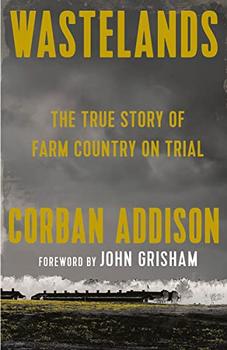Summary | Excerpt | Reviews | Beyond the Book | Readalikes | Genres & Themes | Author Bio

The True Story of Farm Country on Trial
by Corban Addison
Immanuel Stallings was born into slavery, though his father was always free. Marshall Stallings was not a Black man; he was white, a landowner of modest prominence in Duplin County. Immanuel had no memory of his real mother. When he was old enough to inquire of her, he heard that she had died. In his later years, however, he came to believe something darker—that she had been sold by the Stallings family sometime before the Civil War upended the antebellum order and brought emancipation to the enslaved.
By virtue of the genetic lottery, Immanuel was pale enough to stand on the white side of the color line, but the laws of Jim Crow forbade him to claim any sort of standing. While Lincoln might have declared him free, his white neighbors would never consider him their equal. He was Black because his mother was Black. Such were the arbitrary diktats of apartheid.
He grew up in the care of his father's sister, Emily Stallings Teachey. "Miss Emily," as everyone in the family called her, was a kind and generous woman, who loved Immanuel like a son. It was Miss Emily who sold him the first fifteen-acre tract of land in 1891—the very land on which Beulah's house now stands. And it was Miss Emily who, before she died six years later, sold him three more tracts of land, bringing his total acreage to eighty. She wanted to give him an anchor in the world, a piece of God's dirt that no one could take away. She wanted that not only for Immanuel but for his children, and his children's children.
For Beulah. For Elsie.
Elsie's feet are bare and her eyes are bright as she skips across the long-bladed grass, her skin prickling with sweat. She hears the squeak of hogs in the family's pen some distance away, and the sound of Jesse huffing behind her as they pass the peach and apple trees and the chicken coop, with its clucking hens. Her brother doesn't need to ask where they are going, for on a Sunday afternoon in July, with the house too warm for comfort and all the chairs on the porch and in the yard occupied by their elders, there is only one place they would rather be.
The grape arbor.
There are two vines in the garden plot, striking both in their similarity and difference: One produces white grapes and the other black. There are patches of shade beneath the vines, offering relief from the heat. Jesse plops himself down, his upper body rocking slightly on the hinge of his hips, like a metronome in motion. Elsie, meanwhile, examines the fruit. Some of the clusters are still ripening, but others are plump with juice.
She selects a large bunch of black grapes and scampers back to Jesse, holding it out to him. Then she picks a cluster of white grapes and sits down beside him. Her brother is already chewing, murmuring with pleasure, his round face illumined as if by an internal lamp. She removes a grape from its stem and places it between her teeth, smiling instinctively at the sudden burst of flavor. She looks at Jesse and sees his own smile blossom, even as droplets of juice dribble down his chin. She giggles at him and wipes away the excess before it drips onto his clothes. Then she gives him a grape from her own stem, and he returns the favor. The black grape isn't quite as sweet to Elsie's tongue, but its flavor is more complex.
As soon as Elsie polishes off her last grape, she begins to hunt for more, prizing apart the leaves to find the hidden gems. After picking several bunches, enough to share with the family, she returns to her brother's side. She lies back against the grass and stares at the diamonds of sky peeking through the leaves of the vine above her. She feels the humid caress of the breeze, hears the singsong chorus of the birds in the trees and Thelma's laughter echoing across the yard. Her joy at this moment isn't a thought or a feeling. It is a way of being. It is everything.
As a child, she has little consciousness of the hardships her family has faced. She has felt the roughness of her father's hands, seen the lines worn deep into his forehead from long days of labor under the relentless sun. But she knows nothing of the stress of sharecropping tobacco, none of the travails of a Black farmer trying to make an honest living in a world built to keep the Black man down. She understands the structure of segregation from the water fountains and public toilets in Wallace and the way the schoolhouses separate white children from Black. She has experienced the sting of being snubbed by white friends when they see each other in town. But out here among the fruit trees and grapevines, on this fertile land that her granddaddy handed down to her mama and that, one day, her mama will hand down to her, all of that ugliness is just a faint shadow lurking behind an otherwise luminous world.
Excerpted from Wastelands by Corban Addison. Copyright © 2022 by Corban Addison. All rights reserved. No part of this excerpt may be reproduced or reprinted without permission in writing from the publisher.
A book is one of the most patient of all man's inventions.
Click Here to find out who said this, as well as discovering other famous literary quotes!
Your guide toexceptional books
BookBrowse seeks out and recommends the best in contemporary fiction and nonfiction—books that not only engage and entertain but also deepen our understanding of ourselves and the world around us.